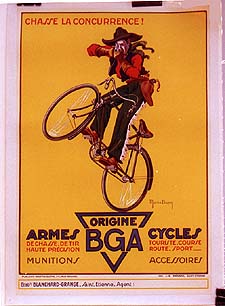Plenty of news in recent days:
- Ordinary bicycles have now joined youth motorbikes and ATVs in the twilight status of not-quite-legal temporary toleration. That’s the impact of a unanimous (2-0) vote (PDF) by the Consumer Product Safety Commission granting the conventional bicycle industry a two-year stay but not exemption from CPSIA’s lead limits (earlier). Since everyday bikes unavoidably contain some lead that is potentially absorbable (if at infinitesimal levels), they are not legal, exactly, but the Commission promises not to go after anyone for selling them, for now. CPSC acting chair Nancy Nord:
We are compelled to deny the petition because the language of the statute does not give us the flexibility to do otherwise, even though our staff does not believe that lead exposure from using bicycles and related products presents a risk that they would recommend the Commission regulate. The risk assessment methods traditionally used by the Commission in evaluating exposure to lead are no longer available to us under the CPSIA.
Nevertheless, we also recognize, as we did when presented with a similar petition filed by the All Terrain Vehicle industry, that safety requires the presence of some lead in the metal used in the product to insure structural integrity. I am also mindful of the staff’s findings that the contact children may have with the parts of the products that contain lead is not extensive and would not present a risk as we have traditionally understood the term—that is, would not increase blood lead levels in any measurable way. Presented with the dilemma of inflexibility in the law vs the need for regulatory action that recognizes safety and good sense considerations, we are opting to stay enforcement.

This course of action is becoming all too frequent for the CPSC. It is needed to avoid market disruptions and to protect consumers. However, it is not the optimal way to implement a statute. - On the other hand — and with potentially catastrophic consequences for businesses large and small — the commission by a 1-1 vote (Nord in favor, Thomas Moore against) turned down a stay (PDF) of the tracking label requirements due for August (earlier here and here). Much coverage at NAM ShopFloor, here (decisions on packaging, whether to etch numbers into products, etc. must be made with much lead time and manufacturers now face staggering costs if they guess wrong), as well as here, here, and here.
- Yesterday the House Small Business Committee held its long-awaited hearings, the first in either chamber since CPSIA took effect, on the law’s calamitous impacts on business. I haven’t had a chance to watch yet, but the House Small Business majority (Democratic) side has put up videos. The impression one gets from reform blogs is that 1) the hearing itself was pretty good but that 2) committee leadership then proceeded to ignore much of what was actually said and rally behind the Waxman line that there’s nothing wrong with the law itself, it’s just that the CPSC leadership hasn’t implemented it properly. [Carter Wood, Rick Woldenberg, Woldenberg’s submitted statement]
- Chalkydoodles has a two-part interview with founder Cecilia Leibovitz of the Handmade Toy Alliance: part I, part II (via ExUrbanis);
- CMMJaime takes a look at the CPSC’s new handbook for resellers, and finds its reassurances for small businesses subjective and vague, particularly when it comes to lines like: “Use your best judgment based on your knowledge of the product”.
- “Toy importer Rob Wilson’s company sometimes sells wooden children’s puzzles, but he hasn’t ordered one since last November.” That’s from the Metro-West Daily News in suburban Boston, which also has this ominous political bit:
McGovern [Rep. James McGovern, D-Mass.] said the federal agency is not being onerous, and businesses should work with it to resolve their worries.
In a written statement, Sen. John Kerry’s office said the measure is meant to keep dangerous products off the shelves, and it needs a chance to work before it is changed.

Public domain paper doll images courtesy Karen’s Whimsy.

5 Comments
The women in the video of the hearing seemed so sweet. How can the government ruin their businesses? But one in particular showed that she was hoisted by her own petard as she expressed her misinformed concern about dangerous items for children. The whole point is that the standards for dealing with lead and phthalates are based on pseudoscience. Ms. Nord seemed like a competent person to me. What is so difficult with the sylogism:
The law requires that zippers on clothing be tested for lead. That is ridiculous. Therefore the law needs to be changed.
That some small businesses are ruined is an unfortunate side effect of the law. If there was a dramatic reduction of harm, then the loss might be acceptable. I doubt if any of the congress people can understand that the law does not meaningfully protect children.
Re the bikes:
This is a perfect decision. Heck, it would have been better to immediately declare the bikes illegal for sale. I say this, not because I think the law as written is wise, correct or right. I say this as rigid enforcement of stupid laws is the best way to get them changed. (Same tactic applies in a workplace setting when dealing with a stupid boss – do EXACTLY what they say to do, with no thought.)
this will show the voters the full effect of the law and they’ll clamor to have it changed. Immagine some dip sh%^ enforcement type from CPSC or a shyster lawyer showing up at your garage sale and slapping you with a suit or criminal charges for selling Billy’s old kiddie bike. Now, once that starts happening, this law will get changed in a hurry and Waxman, et al, will get all the scorn they deserve for enacting this stinking POS piece of legislation.
I agree that the bicycle industry should have been as vocal as the motorbike/ATV folks. Where are the BMX stars? Not on Youtube, not promoting safety (no Bike helmets available for the bike you already own), etc.
My “prospective” senator just might wake up if no bicycles can be sold in this state. He might actually go back and read the wording of the law and see for himself what he voted for.
Also, it must be considered very bad manners for people at hearings to quote chapter and verse of the law back to congress–I wish Ms. Nord had done that at the small biz hearings. This is what the law says, ” . . . ” how should the CPSC interpret that to allow exemptions?
This is one law that is fairly easy to understand without the “plain English” translations.
OK so here is where I post my unscientific survey about a stupid law that not a whole lot of people are paying attention to.
Yesterday at a suburban New York City arts and crafts fair there were plenty of children’s products for sale, same as always.
Also there was a sale by a local public school mother’s club of gently used and new kids items.
I took the time to read the latest handbook and I know that none of this is legal. Problem is the general public doesn’t know, understand or care.
[…] Association has played a role (PDF) in the fight against CPSIA’s (presumably inadvertent) ban on kids’ bicycles; it’s also been dealing with a controversy in the New Jersey […]